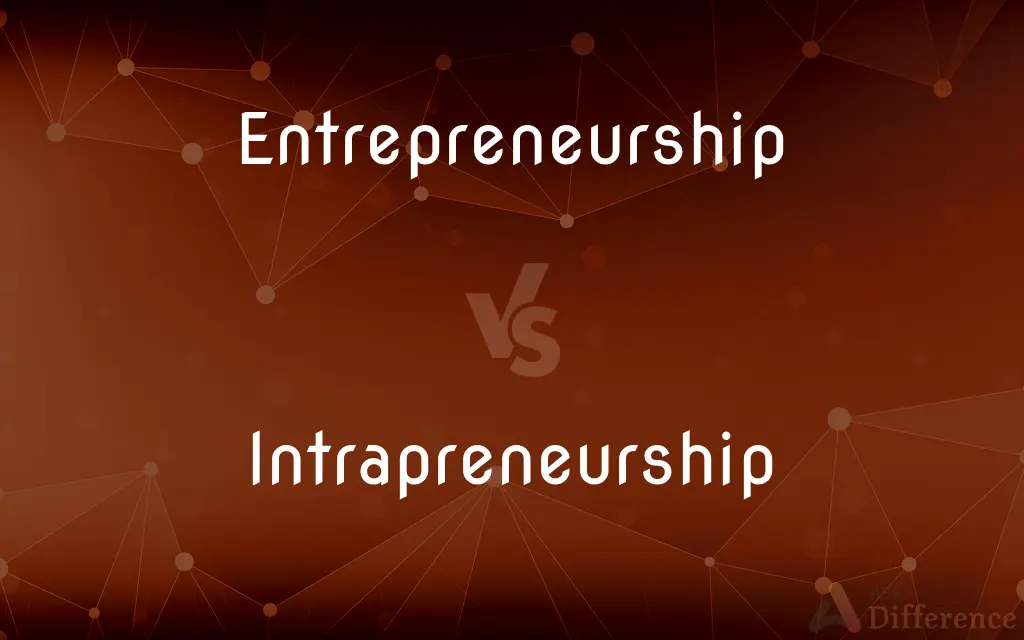Entrepreneurship vs. Intrapreneurship — What's the Difference?
By Tayyaba Rehman & Fiza Rafique — Updated on September 16, 2023
Entrepreneurship involves starting and running your own business or initiative, often taking financial risks. Intrapreneurship is the practice of applying entrepreneurial skills within an existing organization to innovate and solve problems.

Difference Between Entrepreneurship and Intrapreneurship
Table of Contents
ADVERTISEMENT
Key Differences
Entrepreneurship is the act of starting a new business or venture with the aim of making a profit or bringing about social change. Entrepreneurs often shoulder the risks and rewards associated with their initiatives. Intrapreneurship, however, occurs within an existing organization, where employees act like entrepreneurs to drive innovation and solve problems.
Both Entrepreneurship and Intrapreneurship involve creative thinking, innovation, and a willingness to take risks. Entrepreneurship usually involves creating something new, such as a product, service, or even a new industry. Intrapreneurship aims to improve or expand existing services, processes, or products within an organization.
From a grammatical standpoint, both words are nouns and share the root word "preneur," derived from the French word "prendre," meaning "to take." While entrepreneurship is more commonly used and understood, intrapreneurship is a less common term but gaining traction in business lexicon.
Entrepreneurship often necessitates external funding, either through venture capital, loans, or other financial mechanisms to get the business off the ground. Intrapreneurship, on the other hand, generally utilizes the existing resources of the parent organization, which might allocate a budget for intrapreneurial projects.
Comparison Chart
Setting
Independent venture
Within an existing organization
ADVERTISEMENT
Risk
Personal financial risk
Usually backed by the organization
Objective
New business, profit, or social change
Innovation within the company
Financial Support
External funding (e.g., venture capital)
Internal funding from the organization
Grammatical Role
Noun, occasionally used as an adjective
Noun, occasionally used as an adjective
Compare with Definitions
Entrepreneurship
Willingness to take financial risks to create something new.
Entrepreneurship often involves considerable risk.
Intrapreneurship
Utilizing company resources for new project development.
She used intrapreneurship to launch a new department.
Entrepreneurship
A career path that involves multiple business undertakings.
He chose entrepreneurship over a 9-to-5 job.
Intrapreneurship
Entrepreneurial activities within an existing company.
His intrapreneurship helped modernize the firm’s operations.
Entrepreneurship
The act of starting and running a new business.
Her entrepreneurship led to a successful online store.
Intrapreneurship
Internal initiatives aimed at organizational improvement.
Intrapreneurship led to cost-saving measures.
Entrepreneurship
The skillset associated with launching and managing ventures.
His entrepreneurship skills were honed at a young age.
Intrapreneurship
The skillset for internal corporate innovation.
Her intrapreneurship was evident in the new products she developed.
Entrepreneurship
A method of identifying and solving problems to create value.
Entrepreneurship can also focus on social enterprises.
Intrapreneurship
Employees innovating within their current roles.
Intrapreneurship is encouraged to keep the company agile.
Entrepreneurship
Entrepreneurship is the creation or extraction of value. With this definition, entrepreneurship is viewed as change, generally entailing risk beyond what is normally encountered in starting a business, which may include other values than simply economic ones.
Intrapreneurship
Intrapreneurship is the act of behaving like an entrepreneur while working within a large organization. Intrapreneurship is known as the practice of a corporate management style that integrates risk-taking and innovation approaches, as well as the reward and motivational techniques, that are more traditionally thought of as being the province of entrepreneurship.
Entrepreneurship
The activity of setting up a business or businesses, taking on financial risks in the hope of profit
The new business opportunities have encouraged entrepreneurship on a grand scale
Intrapreneurship
The practice of applying entrepreneurial skills and approaches within an established company.
Entrepreneurship
A person who organizes, operates, and assumes the risk for a business venture.
Intrapreneurship
Being creative with ideas and procedures
Entrepreneurship
The art or science of innovation and risk-taking for profit in business.
Entrepreneurship
The quality of being an entrepreneur.
Entrepreneurship
The activity of organizing, managing, and assuming the risks of a business enterprise.
Common Curiosities
Is Entrepreneurship always independent?
Entrepreneurship typically involves independent ventures, although it can involve partnerships.
What is Entrepreneurship?
Entrepreneurship is the act of creating a new business or venture, often involving financial risks.
Are both terms nouns?
Yes, both are primarily used as nouns but can be used as adjectives in some contexts.
How do organizations view Intrapreneurship?
Many organizations encourage intrapreneurship as a way to foster innovation.
What is Intrapreneurship?
Intrapreneurship is the practice of being an entrepreneur within an existing organization.
Do both require risk-taking?
Both involve risk, but entrepreneurship usually entails greater personal financial risk.
Is Entrepreneurship more common than Intrapreneurship?
Entrepreneurship is generally more common and widely understood.
Is Entrepreneurship only about making a profit?
No, entrepreneurship can also aim for social impact.
Can Intrapreneurship lead to a spin-off?
Yes, successful intrapreneurial projects can sometimes become independent companies.
Is funding different for both?
Entrepreneurship often requires external funding, while intrapreneurship is usually funded internally.
Can an entrepreneur become an intrapreneur?
Yes, some entrepreneurs later take roles within larger organizations to act as intrapreneurs.
Can Intrapreneurship be taught?
While some skills can be taught, much of intrapreneurship involves mindset and corporate culture.
What skills are common to both?
Both require creativity, risk-taking, and problem-solving skills.
Is Intrapreneurship a career?
It’s generally a role or mindset within a career, rather than a distinct career path.
Do both contribute to the economy?
Yes, both forms of activity can stimulate economic growth and innovation.
Share Your Discovery

Previous Comparison
Mg vs. Meq
Next Comparison
Measles vs. SmallpoxAuthor Spotlight
Written by
Tayyaba RehmanTayyaba Rehman is a distinguished writer, currently serving as a primary contributor to askdifference.com. As a researcher in semantics and etymology, Tayyaba's passion for the complexity of languages and their distinctions has found a perfect home on the platform. Tayyaba delves into the intricacies of language, distinguishing between commonly confused words and phrases, thereby providing clarity for readers worldwide.
Co-written by
Fiza RafiqueFiza Rafique is a skilled content writer at AskDifference.com, where she meticulously refines and enhances written pieces. Drawing from her vast editorial expertise, Fiza ensures clarity, accuracy, and precision in every article. Passionate about language, she continually seeks to elevate the quality of content for readers worldwide.
















































